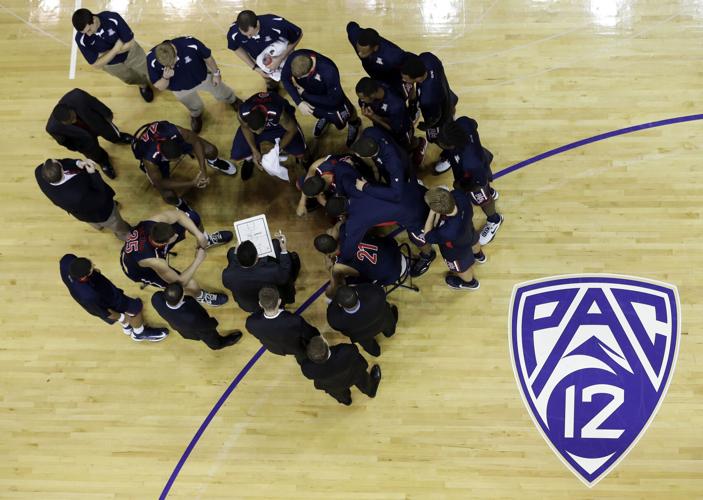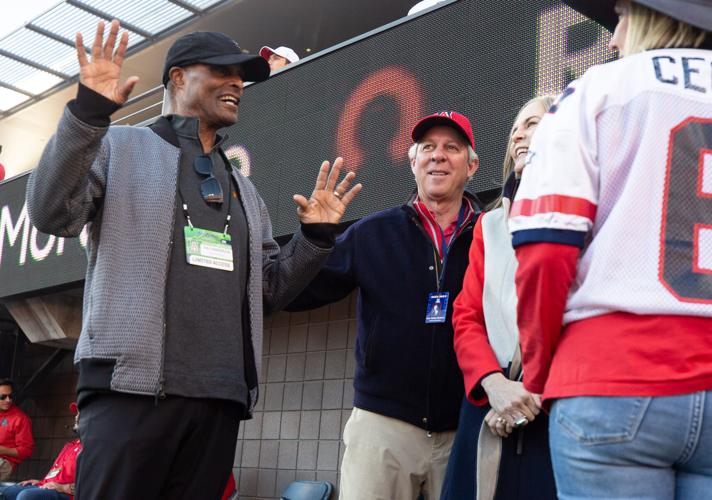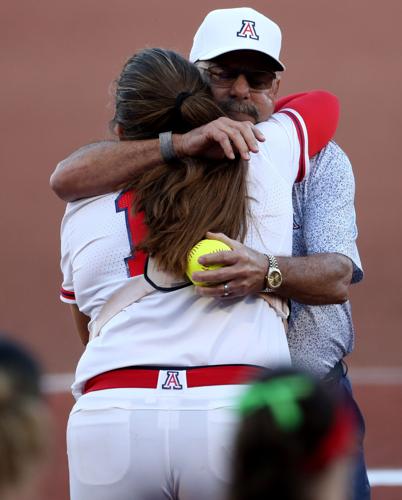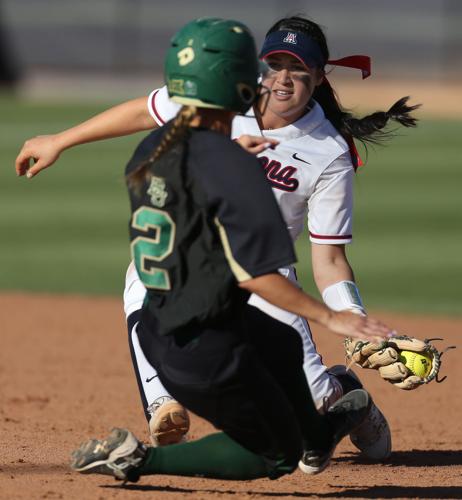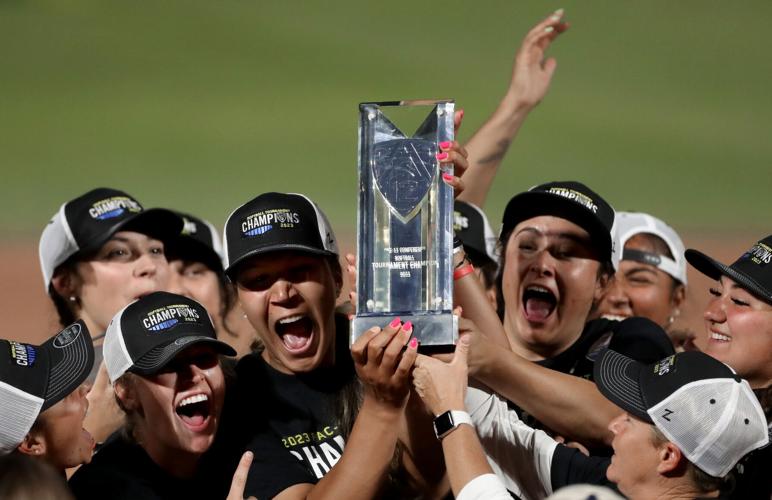By this time next year, the University of Arizona will be part of the Big 12 Conference.
That much is clear.
The Big 12, Pac-12 and UA president Robert C. Robbins confirmed the UA’s departure from the Pac-12 to the Big 12 Friday evening in a series of releases ranging from the excited, to the melancholy to, in Robbins’ case, the promising.
“Athletics serves as the front porch for the University of Arizona, as it is a rallying point for alumni and fans and creates pride in our community both here in Arizona and around the world,” Robbins said. “Our goal always was to secure a bright future for our student-athletes, fans and the entire university community.”

ASU athletic director Ray Anderson, left, greets Arizona president Robert C Robbins during the Arizona State-Arizona football game in Tucson last year. UA and ASU, along with Utah, agreed to leave the Pac-12 and join the Big 12 starting with the 2024-25 academic and sports calendar.
The Pac-12’s point of view came in stark contrast.
“Today’s news is incredibly disappointing for student-athletes, fans, alumni and staff of the Pac-12 who cherish the over 100-year history, tradition and rivalries of the Conference of Champions,” the conference said in its own statement, shortly after it was all but decimated by announced departures Friday of the UA, Arizona State University and Utah to the Big 12, with Oregon and Washington off to the Big Ten.
In all, eight of the conference’s current 12 members have announced they’re going to either the Big 12 or Big Ten — moves that will officially take place following the close of the 2023-24 academic and athletic calendar.
But in terms of most everything else related to the UA’s seemingly hasty exit from the 108-year-old Pac-12 — the westernmost “power” college sports conference served as the athletic home for both Arizona and ASU for the last 45 years — the dust is hardly settled.
What about the financial outlook for the UA, now that it is in an athletic league promising a more stable television and media rights future (and how might farther-reaching travel requirements and other related expenses diminish that benefit)?
How will the move affect the athletes themselves — still students, to be sure — once they’re part of a coast-to-coast conference, rather than one regionally based in the nation’s Westernmost states?
What do others — be them fans watching from a distance, local ticket holders, former athletes, coaches, or others connected to the UA and current Pac-12 sports scene in any number of ways — really think about the big business of college sports?
Clarity on many fronts will likely occur in the coming months. But in the hours after confirmation from the official channels, a similarly varying degree of perspectives spilled out onto social media from current and former athletes, coaches and others tied to the UA and other Pac-12 schools.

Shortstop Mo Mercado (11) of Arizona (Pac-12) has the ball at second base well before Kyla Walker (2) of Baylor (Big 12) can make the steal in the fifth inning of the deciding game in their NCAA Super Regional at Hillenbrand Stadium, Sunday, May 28, 2017, Tucson, Ariz.
Kenzie Fowler Quinn, a Tucson native whose legendary career as a softball pitcher at both Canyon del Oro High School (2006-09) and the UA (2010-14) earned her a spot in the Pima County Sports Hall of Fame’s 2022 class, said she felt “numb” about Arizona leaving the Pac-12.
“(Going to) need some time for this to all sink in. So thankful I was able to play in the conference I did against the opponents we had. Best times of my life. Here’s to the future,” said Fowler Quinn, also a broadcaster who has done work with Pac-12 Networks, via Twitter.
Justice Summerset, an Arizona high school record holder in the high jump (2016) competing for Mountain View High School in Marana before becoming the event’s 2021 Pac-12 champion at Arizona, shared a similar sentiment.
“The conference I grew up watching as a kid from Tucson is no more,” he said, also via Twitter. “Never thought I’d see the day when the block ‘A’ sat next to a different conference logo.
“Truly a sad day for tradition and the history of the Pac.”

Southern California players and coaches celebrate after defeating Stanford 31-28 in the Pac-12 Conference championship NCAA college football game in Santa Clara, Calif., Friday, Dec. 1, 2017.
Jake Fischer, who starred at Ironwood Ridge in Oro Valley before playing four years as a linebacker for the UA football program, countered with excitement.
“Thankful our president is serious about sports! Basketball is going to be insane and football should continue to ascend!” he said over Twitter. “The last two commissioners and the presidents ran our conference into the ground. We had to make the move.”
Khalil Tate, the former UA quarterback who took college football by storm in 2017 with his record-breaking performances and four straight Pac-12 Player of the Week awards, also sees positives in the move.
“(Big 12) media deal is legit,” he Tweeted. “Wouldn’t have to worry about my family changing network providers year in/out just to watch me play (and) different competition, which means more traveling.
“Pac-12 after dark will be missed, but never forgotten. I’m all about forward progression,” he added.
The Star caught up with some former UA athletes and others who have ties to the program through broadcasting or other ventures; they provided perspectives on both leaving the Pac-12 and the potential the Big 12 may bring to UA sports.
Brian Jeffries, longtime play-by-play “Voice of the Wildcats” for UA football, men’s basketball and other sports, said listening to Washington and Washington State games on the radio while growing up was part of what sparked his interest in broadcasting.
“The reason I moved to Tucson was to work on a Pac-10 radio network. The conference has been a part of my life as long as I can remember. It’s sad to see it come to an end. ‘Why’ is for others to determine,” he told the Star. “I’m grateful that the UA administration had the foresight and courage to protect the school’s athletic future by joining a premier conference like the Big 12. I look forward to the new rivals the Wildcats will face starting in 2024.”

The Arizona men's basketball program, gathered on the court in Seattle near the Pac-12 logo, has seen great success in the self-proclaimed "Conference of Champions" since the UA joined the league in 1978. Starting next year, it will be a whole new ballgame across all sports when Arizona joins the Big 12.
Corey Williams is a former Wildcat men’s basketball player who, after his graduation from the UA in 1996, played 12 years professionally overseas before returning to Southern Arizona. He’s been part of college basketball broadcasts for ESPN, Fox Sports and Pac-12 Networks for more than a decade.
“I remember getting recruiting mail in the late (1980s) and early ‘90s (from) all the schools up and down the West Coast. It even had the word ‘Pacific’ in the title. Collectively, they were the place to be. Join one and see them all,” Williams told the Star of the then-Pac-10’s gravitas. “Great coaches, schools and traditions tied together by the West Coast ocean. It’s still unbelievable that all that has to come to an end.
“It’s weird, because what makes sense doesn’t make any sense at all.”
Just a handful of current UA athletes and coaches have made public comments — on social media or otherwise — since Friday’s news, while the school is yet to have Robbins and UA athletic director Dave Heeke speak publicly.
UA men’s tennis coach Clancy Shields, a two-time Pac-12 Coach of the Year, was efficient with his own thoughts while quote-tweeting Arizona Athletics’ official announcement: “Moving forward, embracing change.”
Specifically in relation to the Big 12 news, UA soccer coach Becca Moros said via Twitter she is “Excited for new beginnings.”
Speaking to local media after a practice Friday morning, Arizona football coach Jedd Fisch said conference realignment brings new experiences to the athletes on his team.
“These kids are going to play some teams maybe they haven’t played before, they’re going to see some things maybe they haven’t seen before, and all of college football has changed, and I think it will probably change again in the next three-to-five years,” Fisch said. “You see Texas playing Alabama every year … you see UCLA flying across the country to go play Ohio State — things that these kids have never thought they could experience.”
Rem Bakamus, director of player development for the UA men’s basketball team, added about the Big 12, also on Twitter: “Best conference in the world!”

Utah hoists the hardware after a 7-4 win over the No. 2 team in the nation, UCLA, in the championship game of the Pac 12 Softball Tournament, Hillenbrand Stadium, Tucson, Ariz., May 13.
Current and former athletes at other schools, like ASU, Oregon and Cal, did share concerns about what the change to either the Big Ten or Big 12 will mean for athlete wellness.
“Has anybody thought about the repercussions that conference realignments have on student athletes’ quality of life?” Terra McGowan asked on Twitter.
McGowan was an All-American catcher who played her final college softball season for Oregon this past spring; she started her college career at ASU.
“You’re asking them to travel across the country every other weekend while balancing school and a social life? This needs to be talked about more,” she said.
Added her Oregon teammate, Paige Sinicki, also on Twitter: “I picked to play in a high-level softball conference where being close to home would allow my parents to come watch my games. It’s unfortunate to hear that my senior year I’ll be playing as far as New Jersey (Rutgers) as well as other East Coast schools.”
ASU sophomore catcher Shannon Cunningham, originally from Tustin, California, echoed those sentiments in her own Tweet.
“I chose to play in the Pac-12 because of the ability to play close to home and in front of family. I chose the Pac so my family didn’t have to worry about far travel or giving up all their vacation time just to come see me. This affects athletes in every sport (and) academics.”

Former Arizona softball coach Mike Candrea gets a hug from Izzy Pacho (15) after he threw out the ceremonial first pitch before the Wildcats’ game against Arizona State in the inaugural Pac-12 Softball Tournament on May 10 at Hillenbrand Stadium.
In an interview with D1Softball.com, legendary Arizona coach Mike Candrea shared his own disappointment in what happened to the Pac-12, the near-consensus No. 1 college softball league in the nation for decades.
“It is devastating for me. It is heartbreaking,” he said. “I am so glad I was able to be part of that conference for the years I was involved. It was a very special place to coach and play.
“I think the growth of softball kind of began with the Pac-10/Pac-12 and it’s hard to see it kind of crumbling,” he added. “It was just a fun conference because you played a World Series-type game every time you took the field.”
Michael Lev column: Still reeling from Arizona’s departure from the Pac-12? Hopefully this list of 12 things to look forward to in the Big 12 will boost your spirits.
What went wrong for the "Conference of Champions?" What now with the Wildcats heading to the Big 12?
Michael Lev: Pac-12 incompetence left Arizona little choice but to join the Big 12; it’s a promising day for the Wildcats, a sad one for the league they’re leaving behind.
The University of Arizona is joining the Big 12 Conference along with rival ASU and Utah, leaving the Pac-12 after the 2023-24 season.
The University of Arizona is officially leaving the Pac-12 — a conference it has called home since 1978 — and joining the Big 12.
What would a world with Arizona as a Big 12 opponent look like? We lay out a potentially new reality for the Wildcats.


